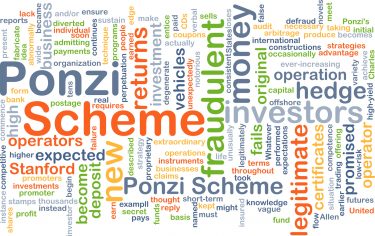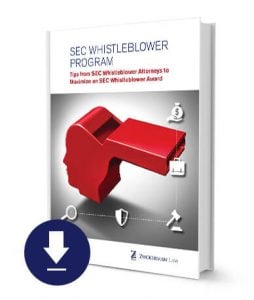What is a Ponzi scheme?
 A Ponzi scheme is a type of investment fraud that leads investors to believe the “returns” on their investments are coming from generated profit, when in fact these payments come from funds contributed by new investors. The scheme is named after Charles Ponzi, who defrauded thousands of investors with his postage stamp scheme in 1920.
A Ponzi scheme is a type of investment fraud that leads investors to believe the “returns” on their investments are coming from generated profit, when in fact these payments come from funds contributed by new investors. The scheme is named after Charles Ponzi, who defrauded thousands of investors with his postage stamp scheme in 1920.
A Ponzi scheme can maintain the illusion of a sustainable business as long as new investors contribute funds, and as long as most of the investors do not request full repayment in the short-term. Since a Ponzi scheme produces little or no legitimate earnings, it requires a constant flow of new money to survive. As such, Ponzi scheme organizers aggressively solicit new investors by, among other things, promising high returns with little or no risk. For example, Charles Ponzi promised investors a return of 50% in 45 days, or a full return in just 90 days. See additional “red flags” for Ponzi schemes below.
When it becomes hard to recruit new investors or when a large number of existing investors cash out, Ponzi schemes tend to collapse. Charles Ponzi’s scheme ultimately fell apart when The Boston Post began to investigate his returns, and a significant number of investors tried to pull their money out of it.
Importantly, Ponzi schemes can be stopped before their collapse if individuals report the schemes to the U.S. Securities and Exchange Commission (SEC). Under the SEC Whistleblower Program, the SEC will issue awards to whistleblowers who report Ponzi schemes (or any information concerning violations of the federal securities laws) if that information leads to successful enforcement actions with total monetary sanctions in excess of $1 million. Under the program, a whistleblower may receive an award of between 10 to 30 percent of the total monetary sanctions collected. If represented by counsel, a whistleblower may submit a tip anonymously to the SEC.
The leading SEC whistleblower lawyers at Zuckerman Law have extensive experience representing SEC whistleblowers both domestically and internationally. If you have original information about a potential violation of the U.S. federal securities laws, contact leading SEC whistleblower law firm Zuckerman Law for a free, confidential case review by calling +1 (202) 930-5901 or +1 (202) 262-8959.






What are some “red flags” for Ponzi schemes?
According to the SEC, there are certain red flags for Ponzi schemes that investors should look for:
- High investment returns with little or no risk
- Overly consistent returns
- Unregistered investments
- Unlicensed sellers
- Secretive and/or complex strategies
- Issues with paperwork
- Difficulty receiving payments
For more information on Ponzi schemes and examples of SEC enforcement actions against Ponzi schemes, see the SEC’s Spotlight on Ponzi schemes.
SEC Whistleblower Program: Rooting Out Ponzi schemes
In its short history, the SEC Whistleblower Program has had a tremendous impact on securities enforcement and has been replicated by other domestic and foreign regulators. Since August 2011, the SEC has received over 33,00 whistleblower tips. The largest SEC whistleblower awards to date are:
- $50 million,
- $39 million, and
- $37 million.
For more information about the SEC Whistleblower Program and how to report a Ponzi scheme, download the eBook: Tips from SEC Whistleblower Attorneys to Maximize an SEC Whistleblower Award.
SEC Enforcement Actions Against Ponzi schemes
The SEC has recently shut down several large Ponzi schemes, including the following schemes.
SEC Halts $85 Million Ponzi Scheme
On May 1, 2018, when the SEC unsealed fraud charges against a Mississippi company and its principal who defrauded at least 150 investors in an $85 million Ponzi scheme.
Arthur Lamar Adams told investors that their money would be used by his company Madison Timber Properties, LLC (“MT Properties”) to acquire timber-harvesting rights from various landowners in Alabama, Florida or Mississippi. The company would later harvest the timber and pay investors with the profits. Many investors were told that they had the sole rights to the specific land tracks, and Adams promised each investor, among other things, a security agreement and a title search certificate. In fact, MT Properties never obtained the harvesting rights to the land as claimed and Adams forged the documents pertaining to the timber on the land tracks. Adams used investor funds to construct real-estate developments, which investors were never told about, and also personally pocketed the cash. Additionally, Adams used funds from new investors to pay the returns owed to existing investors. After operating his scheme for at least 15 years, Adams plead guilty to the securities fraud charges and was sentenced to almost 20 years in prison.
SEC Obtain Asset Freeze to Halt $102 Million Ponzi Scheme
On June 19, 2018, the SEC announced it filed charges and obtained an asset freeze against five individuals and three companies who were behind a $102 million Ponzi scheme that defrauded at least 637 investors throughout the U.S.
The individuals targeted retired investment professionals and persuaded them to withdraw their savings from traditional investments and invest in issuers they controlled. The schemers claimed that investors’ money would be used to operate businesses in various fields, including financial services, real estate, and insurance. Through their various companies, the investors promised annual returns of 6% to 8% and bonuses of 10% to 19% upon initially investing. In certain instances, the schemers provided investors with bonus funds or interest payments, and in other cases they provided redeeming investors with all or part of their funds, sometimes with returns. These were Ponzi payments taken from new investor funds rather than actual investment returns. Additionally, the individuals failed to fulfill the requests of investors to redeem their investments.
One investor invested $936,000 and was only repaid $15,000. The scheme began to fall apart when law enforcement began to get suspicious of one of the individuals’ activities. Specifically, when he came to the Middle District of Pennsylvania to purchase a business from an investment advisor “for the sole purpose of finding new victims to exploit.” The investigation is continuing in Pennsylvania as well as New York.
SEC Stops $345 Million Ponzi Scheme
On September 19, 2018, the SEC announced an asset freeze against three individuals who orchestrated a Ponzi-like scheme that raised more than $345 million from over 230 investors across the United States. Two of the three fraudsters worked together to offer and sell purported investments in consumer debt portfolios. They each maintained their own entities, creating a more legitimate scheme, and offered investors the option of four structures of investments in which to invest. After a significant number of new investments had been made, the individuals would pool this money with that of other investors, comingle investors’ money in common bank and accounts and use the funds to repay previous investors.
Investors were promised 100% of net collections up to 25% of the principal investment annually, with profits over 25% split 50/50, and profits over 41% split 80/20. The investors were in fact were repaid, if at all, with their own or other investor’s money and not with collections from the debt portfolios in which they thought they had invested. These low-risk, high-return investments that never lose should be a red flag. Additionally, when pitching to investors, the fraudsters created various fake documentation to support the legitimacy of their Ponzi scheme, including fake purchase and sale agreements with forged signatures, and also fabricated debt portfolios to stand in the place of the actual, unpurchased portfolios.
SEC Halts $1 Billion Ponzi Scheme
In January 2019, the SEC obtained final judgments in the lawsuit against the Woodbridge Group of Companies LLC (“Woodbridge”) for operating a massive Ponzi scheme that targeted over 8,400 retail investors. The company was ordered to pay $1 billion in penalties and disgorgement.
On December 21, 2017, the SEC filed an emergency action against the company and its former owner and CEO, Robert H. Shapiro, for defrauding investors, many of them seniors who had invested their retirement funds. Woodbridge advertised its primary business as issuing loans to “third party” commercial property owners, paying the company 11% – 15% annual interest for short-term financing. In return, Woodbridge promised to pay investors 5% – 10% interest annually. Woodbridge advertised an “over 90% renewal rate” and “low-risk” and “conservative” investments. While Woodbridge claimed it made high-interest rate loans to third parties, the vast majority of borrowers were Shapiro-owned companies that had no income and never made interest payments on the loans. Shapiro and his company took money from new investors to pay existing investors, raising over $1.22 billion. The scheme continued for five years, and fell apart in early December 2017, when Shapiro and Woodbridge missed their first interest payments to investors after ceasing their fundraising activities and filed for Chapter 11 bankruptcy.
In August 2018, the SEC charged five individuals and four companies in connection with the Woodbridge scheme for unlawfully selling the company’s securities. The four individuals sold more than $243 million in unregistered securities, targeting investors at retirement planning seminars, and claiming the investment was “safe and secure.” The individuals held no securities licenses, were not registered sales agents with the Commission, and were not associated with registered broker-dealers. At a certain point, the companies were not making any of the promised interest payments, so Woodbridge encouraged its investors to “roll over” their investment into a new promissory note to avoid coming up with the cash to repay the principal. For the payment of returns to investors who did not roll over their notes, Woodbridge raised and used new investor funds “in classic Ponzi scheme fashion.” When Woodbridge filed for bankruptcy in December 2017, there was more than $961 million in principal still due to investors.
For more information about Ponzi schemes, see the SEC’s General Resources on Ponzi schemes.
SEC Whistleblower Attorneys






If you would like more information on reporting a violation fo the federal securities laws, contact an SEC Whistleblower Attorney at Zuckerman Law for a free, confidential consultation. Zuckerman Law is one of the nation’s leading law firms representing whistleblowers in whistleblower rewards and retaliation cases. For more information about SEC whistleblower awards, download our eBook:
Click below to hear SEC whistleblower lawyer Matt Stock‘s tips for SEC whistleblowers:
Ponzi Scheme SEC Whistleblower Lawyers
How to Qualify for an SEC Whistleblower Bounty
- See our column in Forbes: One Billion Reasons Why The SEC Whistleblower-Reward Program Is Effective.
- See our column in Going Concern: Sarbanes-Oxley 15 Years Later: Accountants Need to Speak Up Now More Than Ever.
- See our post in Accounting Today: Whistleblower Protections and Incentives for Auditors and Accountants.
- See our post in The Compliance and Ethics Blog: Shkreli Trial Reveals the Challenges Faced by Compliance Whistleblowers.
Are Whistleblowers Protected from Retaliation?
Click here to learn more about anti-retaliation protections for SEC whistleblowers under the Dodd-Frank Act and Sarbanes-Oxley Act.





